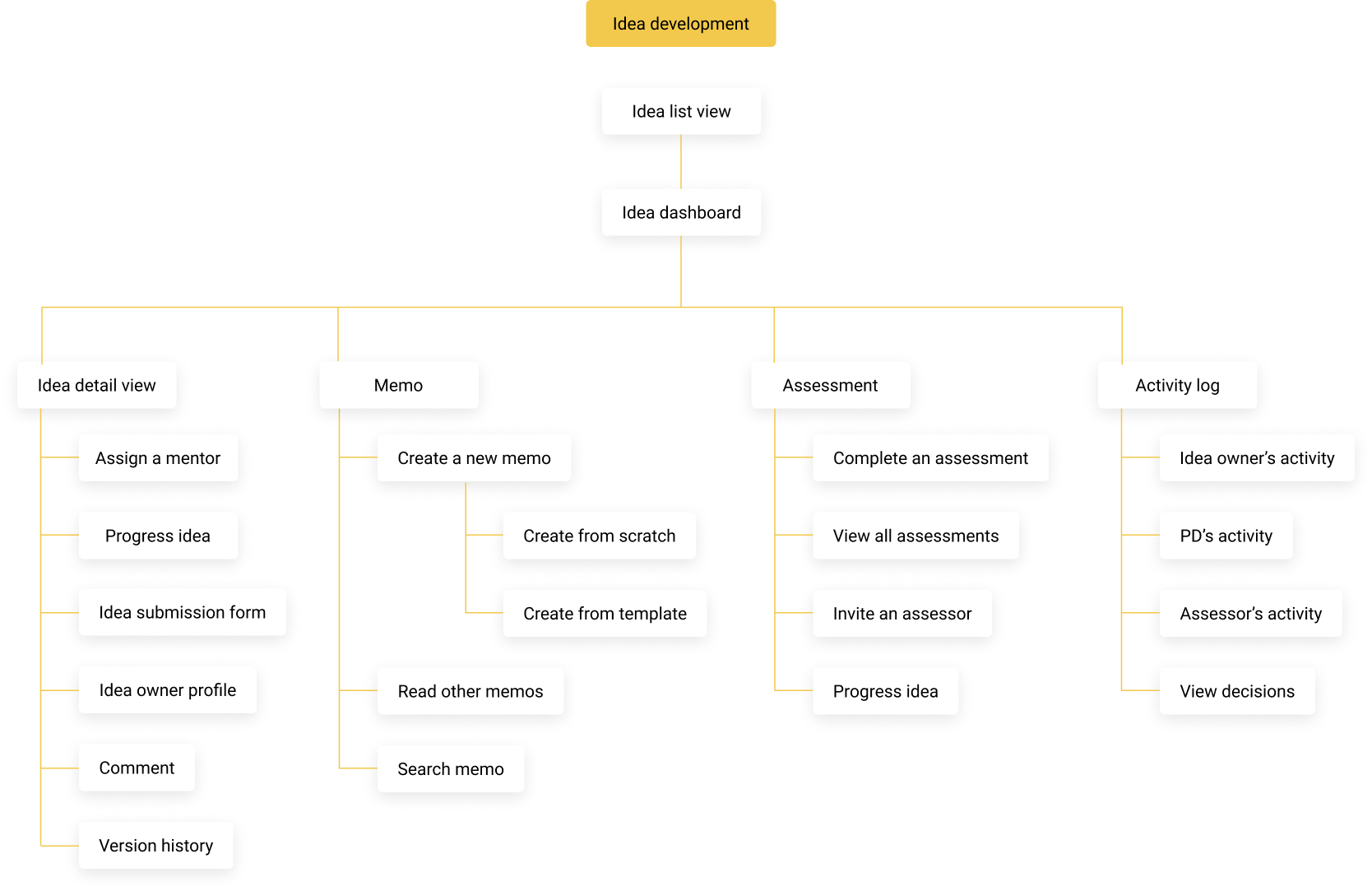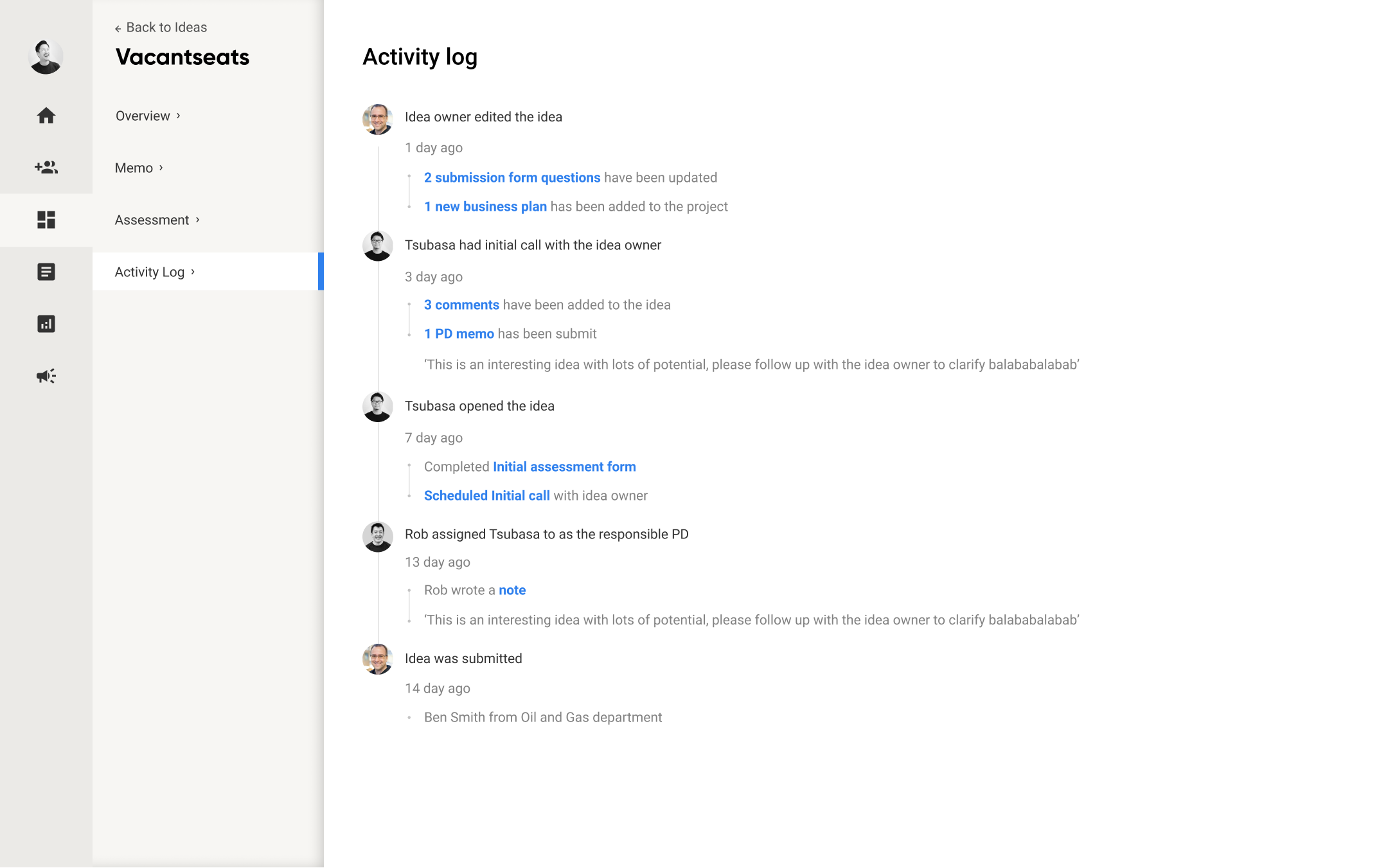Background
Moon Creative Lab has been running crowd-sourcing activities on behalf of Mitsui & Co for two years. 44,000 Mitsui employees can submit their business ideas to Moon. Moon assigns a program designer to work with the idea owner to develop their ideas into new business ventures.

Moon's idea incubation process
As Moon started receiving more and more inbound ideas, Moon struggled to manage and develop all the ideas along with idea owners. I was asked to design a tool that helps Moon manage all their workflows.
Research
Since I was new to the crowd-sourcing operation, I started by diving in the problem via user research and building up a deep understanding of the problem.
Observations
User interview
Manager group discussion
Joined Slack and email group
Attend meetings
Pain points
Past project experiences
Discuss problems the team is facing
Plans for scaling in the future
To better summarize all of my findings, I created an "idea journey" to map out the operation process of idea incubation and identified important tasks need to be done.

Idea incubation process
The primary users for this project are Program Designers who work closely with idea owners to develop ideas. The secondary users are Program Designer Leads who want to track the progress of all idea development. I also identified pain points in the current workflow:
PD team's workflow is mostly manual and inefficient
Learn-by-doing process; PDs need to quickly learn new things
Hard to collaborate with idea owners and other PDs
Use spreadsheet to keep track of ideas.
Spend lots of time keeping the spreadsheet up-to-date
PDs use varying tools to summarize research findings and often end up duplicating work
Mostly send updates via Slack standdown
3-hour-long idea discussion meetings
After sharing findings with the Product Manager, we worked together to redefine the problem statement to be
Design a tool that
streamlines the workflow for PDs
and
helps them focus on developing ideas
Ideation
Because we were building this product up from scratch, I wanted to engage the PM, researcher, and engineers at an early stage. I led a series of team workshops to generate new concepts and co-develop the concept.


Collect inspirational screenshots
Speed-dating brainstorming
Through these exercises, I realized we needed different workflows for the two stakeholders: Program Design Leads (managers) and Program Designers (individual contributors). I did a task mapping to separate tasks between these two.

The task flow of both Program Design Leads and Program Designers
The mapping visualizes different scenarios that describes how different users may interact with the interface to accomplish their own goals. It also helps us view the entire project from end to end.
Iteration
To have an holistic view of the process, I worked closely with the Product Manager to create an information architecture to define the product requirements and see how the pieces come together to inform the overall experience.

Information architecture that communicates the functional requirements
I explored different layout and page designs based on the user-flow and information architecture defined before. Though iteration, as a team, we started seeing certain design patterns we all like and iterating on the design from rough to concrete.

Low-fidelity wireframe
Eastern and western design differences
Because a large percentage of Mitsui employees are Japanese, my design needs to accommodate both eastern and western culture. Eastern interface design provides a sectioned framework, where more information can be browsed all on one page. Western design tends to have bigger margins and more spacing to ensure a smooth reading experience.

Explorations between Eastern design and Western design
Keeping in mind this difference between eastern and western design, I took a mixed approach, using a sectioned framework to show more information in one screen and enough spacing to ensure a comfortable reading experience.
Design
After a few rounds of iteration and guerrilla testing with actual users, I iterated the design from low fidelity all the way to high fidelity.
Manager flow: PDL assigns a PD
The dashboard view helps managers stay on the top of the idea sourcing and incubating progress without losing themselves in details. Managers can assign PDs based their current workload and expertise to ensure better matching.

PDLs (managers) can see a list of ideas and keep track of project progress.
They can view the entire idea, include its submission form, idea owner profile, and comments
Later on, they can assign a PD based on expertise.


Individual contributor flow: PD develops an idea
Developing and incubating an idea is an iterative process and takes a lot of back-and-forth between PDs and idea owners. PDs take a lot of notes while doing research and talking to idea owners. With the memo feature, all their notes can be stored along with the idea itself.

PDs (individual contributors) can use this feature to view and progress an idea.
While working on the idea, they can use the memo feature to summarize research findings and make notes of the discussion.
When coming to the evaluation phase, PDs can use the assessment feature to manage feedback.
The idea development process normally takes a few months. PDs and PDLs can use the activity log feature to stay on top of updates.




















